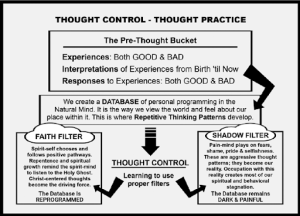Do you ever feel like your thoughts are controlling you instead of the other way around? Do negative thought patterns and emotions seem to take over, leaving you feeling powerless and stuck in unproductive behaviors? If so, you’re not alone. Understanding the origin of thoughts and thought processes can be the key to restoring honesty as a living element in our bodies and minds. Difficult past circumstances or memories of past behaviors cause us sorrow now because of the thought patterns we currently allow to flow through us. A lesson I learned through decades of hard experience. By practicing thought control, we can choose our thought filter and reject negative thought patterns, leading to true healing and a more fulfilling life.
Understanding more about the origin of thoughts and thought processes will help us restore honesty as a living, thriving element in our bodies and minds. We then can do the work of practicing thought control and watch the miracles happen. We will use this Tool to work all the 12-Steps—throughout life. The promise is that our thoughts will no longer condemn, unsettle, or control us. No dread, shame, or emotional trigger will overpower us because we have learned how to immediately choose and employ faith when a threatening thought enters our conscious mind. We cannot control what pops onto the stage of our minds, but we certainly can control how it affects us and how long it hangs around.

We can follow the Thought diagram by simply seeing each box as a bucket in which we have essential elements stored. In the pre-thought bucket, we have everything that has happened to us since birth. Every experience, good or bad, traumatic or loving, whether we remember them or not, is in this bucket. Equally important, in that same bucket, we have stored our interpretation of each experience. Pain is the great instructor.
Simply put, as we mature, our responses to memories and other current experiences change, which then causes more interpretations. Again, without proper tools, we may develop responses not based on truth but on other people’s intentions or circumstances beyond our understanding, etc. This bucket is a shifting, developing mass that, at first consideration, causes frustration. It may seem as though we are doomed to endure the pain of misinformation and misinterpretations forever. The knowledge that we have been sent here to this earth to be challenged to the core—then find our path back to peace and God through discovering and trusting Jesus Christ—will give us courage. The truth is that pain is the great instructor. God knows this, and we must come to learn and appreciate this phenomenon. This is the human experience part of the Plan of Salvation.
While we are busy experiencing and interpreting life in our pre-thought subconscious mind, we are filling another bucket, which is a self-database of emotions and feelings about the first bucket. We entertain incorrect interpretations, which cause angst, worry, and anxiety, albeit we must remember that the interpretations are often based on untruth. This self-database is full of self-judgment (good or bad), feelings of love, and feelings of disgust. These feelings burst onto the conscious mind through thoughts. As discussed in an earlier chapter, these thoughts create thought patterns. These patterns can be the type that produces beautiful feelings of connection with God or loved ones, or they can be patterns that lead to destructive self-hate, self-pity, blaming, controlling, or manipulating in varying degrees. This is not due to being evil. It is due to being human beings with a pain-mind and a spirit-mind in a contest for a soul. Just think, we signed up for this, we said we would, so here we are—it is what it is.
There is tremendous hope in understanding these things because our Godly DNA provides thought-choice, whether we are exercising that choice or not. We can be freed from a victim mindset because we now believe in our own ability to change how we think; we will not remain victims of any circumstance or experience. So, when a thought enters our mind that brings anxiety, pain, or distress of any kind, we can know that we can choose which thought filter we will employ, the faith filter or the shadow filter. Choose the faith filter over the shadow filter.
Thoughts come from feelings that feed on past interpretations, which fuel more thoughts. It is a merry-go-round. Feelings about past behaviors or experiences triggered by a specific look, somebody’s casual comment, a smell, a place, a picture, or any combination of things cause a response. The emotional response to the trigger can bring on a painful physical reaction in our bodies. Other responses include thoughts and feelings leading to anger, pity, resentment, blame, and beliefs that we will never measure up to others’ or the Lord’s expectations. All of these are pain-based responses. With no active defense in place, we are left with the natural desire to do whatever is required to stop the pain. If a substance or behavior has been our relief of choice, we desperately seek that relief. When the thought becomes repetitive, then the go-to place is the sought-out-relief thought pattern. We find a strange kind of satisfaction in stewing in anger and the other negative feelings produced by the thought.
Our thoughts have a powerful impact on our lives, and negative thought patterns can leave us feeling powerless and stuck. However, by understanding the origin of thoughts, we can take control of our thinking and choose to reject negative thought patterns. If we are willing to do the detailed work of thought-practice we will not be controlled nor troubled by any repetitive, negative thought pattern. We can fundamentally adhere to the truth that we are not defined by the abusive behaviors of others, our past challenges, or misinformed responses. Through the practice of thought control, we can choose our thought filter and employ faith to overcome threatening thoughts and emotions. This requires hard work and dedication, but the rewards are a more fulfilling and peaceful life. With our Godly DNA, we have the power to change how we think and not remain victims of circumstance or experience—we can experience healing.
















